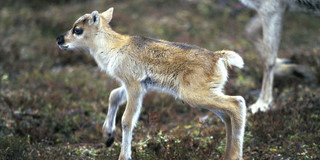 Scientists from the UCL University have discovered that reindeer can not only see ultraviolet (UV) light, but that it is also crucial to their survival in the harsh Arctic environment.
Scientists from the UCL University have discovered that reindeer can not only see ultraviolet (UV) light, but that it is also crucial to their survival in the harsh Arctic environment.
A research team from the UCL, funded by the Biotechnology and Biological Sciences Research Council, published a study which shows that this remarkable visual ability allows reindeer to take in life-saving information in conditions where normal mammalian vision would make them vulnerable to starvation, predators and territorial conflict.
Winter conditions in the Arctic mean that the sun barely rises in the middle of the day and light is scattered such that the majority of light that reaches objects is blue or UV. In addition to this, snow can reflect up to 90% of the UV light that falls on it.
"We discovered that reindeer can not only see ultraviolet light but they can also make sense of the image to find food and stay safe. Humans and almost all other mammals could never do this as our lenses just don't let UV through into the eye." Says Glen Jeffery, Professor of Neuroscience at the UCL Institute of Ophthalmology, and the lead researcher on the project.
 Humans are able to see light with wavelengths ranging from around 700 nanometres (nm), which corresponds to the colour red, right through all the colours of the rainbow in sequence to 400nm, which corresponds to violet. Professor Jeffery and his team tested the reindeer's vision to see what wavelengths they could see and found that they can handle wavelengths down to around 350–320nm, which is termed ultraviolet, because it exceeds the extreme of the so-called visible spectrum of colours.
Humans are able to see light with wavelengths ranging from around 700 nanometres (nm), which corresponds to the colour red, right through all the colours of the rainbow in sequence to 400nm, which corresponds to violet. Professor Jeffery and his team tested the reindeer's vision to see what wavelengths they could see and found that they can handle wavelengths down to around 350–320nm, which is termed ultraviolet, because it exceeds the extreme of the so-called visible spectrum of colours.
"When we used cameras that could pick up UV, we noticed that there are some very important things that absorb UV light and therefore appear black, contrasting strongly with the snow. This includes urine – a sign of predators or competitors; lichens – a major food source in winter; and fur, making predators such as wolves very easy to see despite being camouflaged to other animals that can't see UV." Says Jeffery.
 The research also raises the question of how reindeer protect their eyes from being damaged by UV, which is thought to be harmful to human vision.
The research also raises the question of how reindeer protect their eyes from being damaged by UV, which is thought to be harmful to human vision.
"In conditions where there is a lot of UV – when surrounded by snow, for example – it can be damaging to our eyes. In the process of blocking UV light from reaching the retina, our cornea and lens absorb its damaging energy and can be temporarily burned. The front of the eye becomes cloudy and so we call this snow blindness. Although this is normally reversible and plays a vital role to protect our sensitive retinas from potential damage, it is very painful."
"The question remains as to why the reindeer's eyes don't seem to be damaged by UV. Perhaps it's not as bad for eyes as we first thought? Or maybe they have a unique way of protecting themselves, which we could learn from and perhaps develop new strategies to prevent or treat the damage the UV can cause to humans." Professor Jeffery added.
Source: UCL
